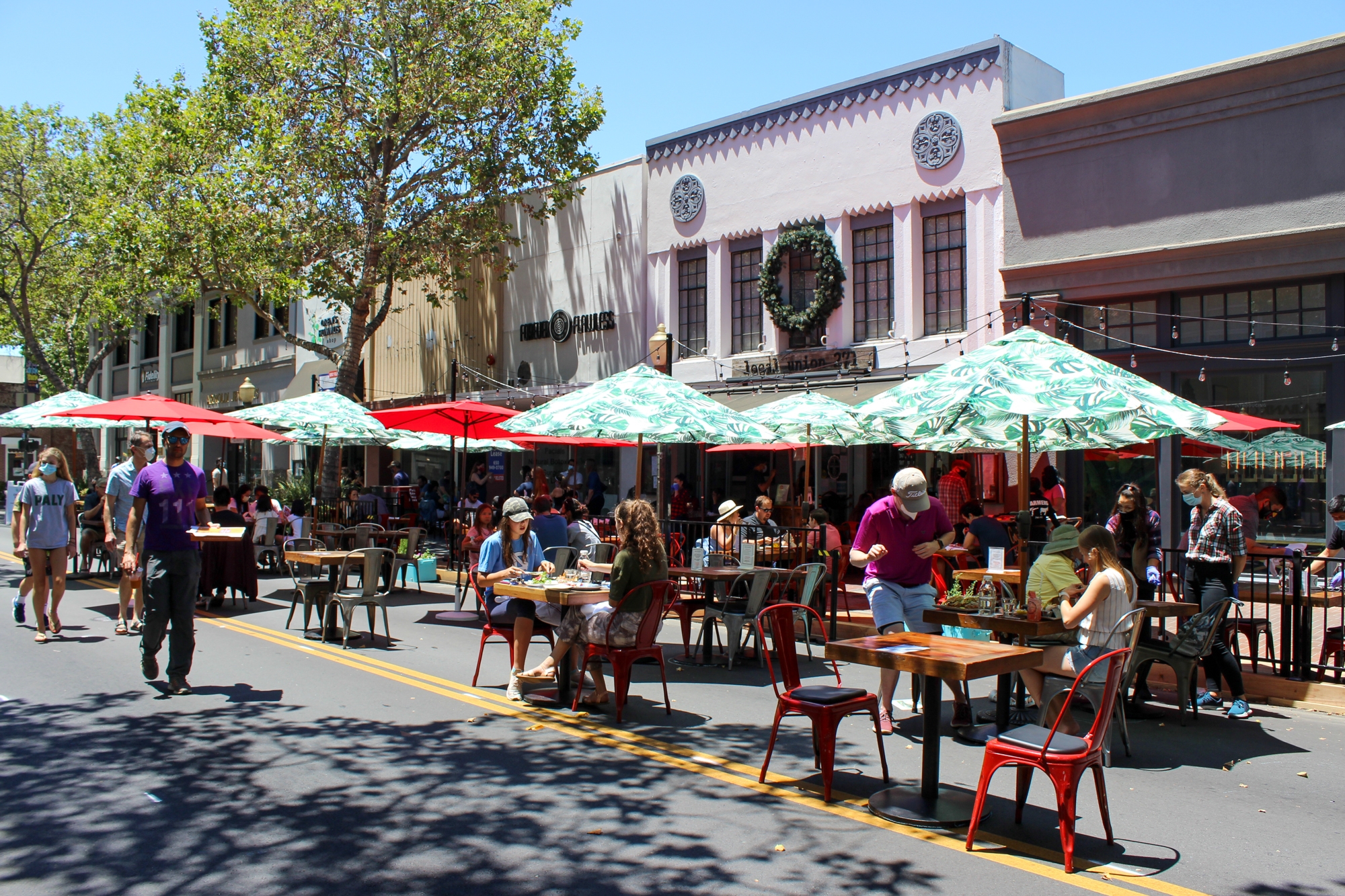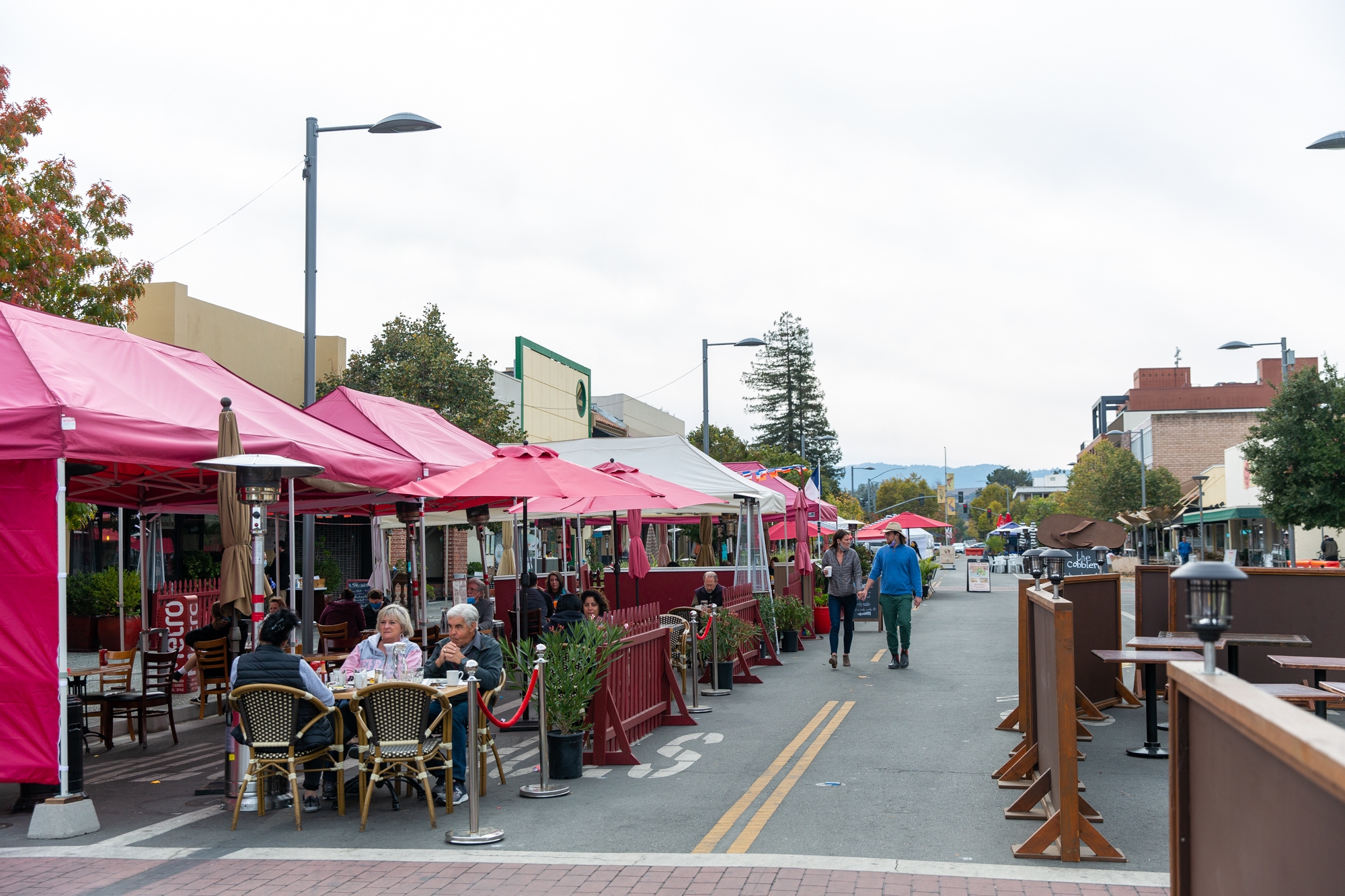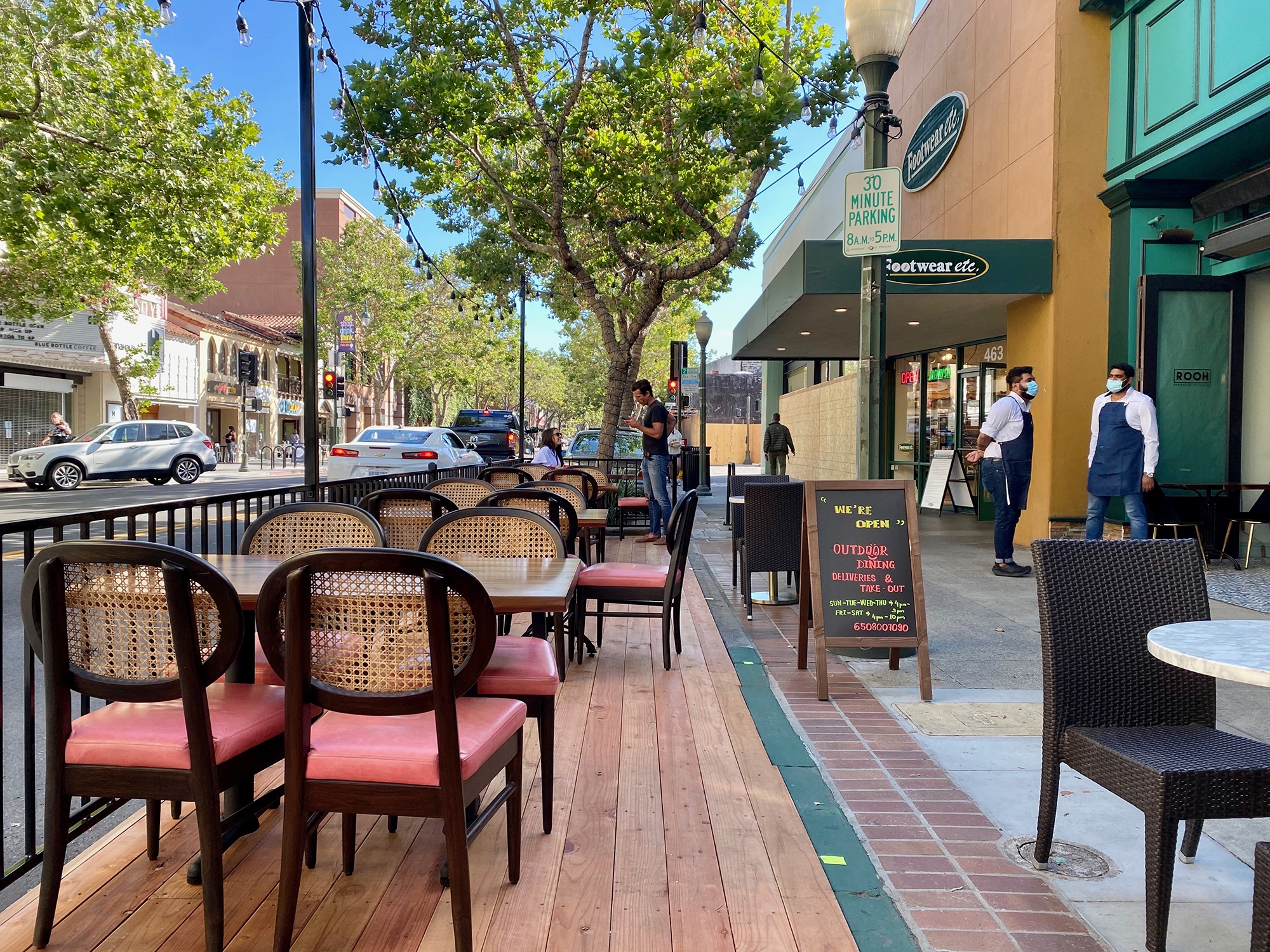Diners may rave about downtown Palo Alto's flourishing outdoor dining scene, but for Elie Monarch the ongoing closure of University Avenue has been anything but a boon.
Like most other retailers throughout downtown, Monarch, who owns Footwear Etc. on University, has seen business dwindle over the course of the pandemic. Many area restaurants have since rebounded, boosted by the city's decision last year to close University and a portion of Ramona Street to car traffic to facilitate outdoor dining. Monarch's stores in Walnut Creek and San Mateo have rebounded nicely and have seen business go up by 10% over prepandemic levels in recent months, he said. The Palo Alto store, by contrast, is at about 50% of its prepandemic business, Monarch told this news organization.
"Most stores recovered very fast once people were coming out," Monarch said. "This one just languished."
He believes the city's decision to close off University Avenue to cars is at last party to blame. He said he supported the city's move toward parklets last summer to facilitate outdoor dining, a program that Rooh and other restaurants on his block have taken advantage of. But as the Uplift Local program evolved and the city moved to close off streets and to allow restaurants to erect large tents for their outdoor operations, Footwear Etc. became obscured by the new structures and its business has continued to suffer.
"We thought, 'OK, things are bad everywhere,' but other towns have similar programs and we recovered much faster when they don't have tents or closed streets," Monarch said.
Monarch is not alone in calling for the city to reopen University Avenue to cars. Cherry LeBrun, owner of De Novo Contemporary Jewelry, wrote in a letter to the City Council that having University and a portion of Ramona closed to cars has cut access to her business dramatically and has decreased foot traffic by more than 80%.
"This has and continues to have, a very damaging impact on sales in my retail jewelry store," LeBrun wrote.
Gwen Gasque of Letter Perfect suggested that while the closure of University Avenue to cars feels more communal, suggesting that it's good for businesses, the closures create a "fairground atmosphere" that isn't suitable for the type of retail consumption that her business relies on to stay in business. And Hassan Ali, branch manager at Citi Bank at 250 University Ave., wrote that customers are "complaining about not being able to access the branch location and also have shared their concern about not feeling safe in walking … far away to a parking area with money and valuables."
"And this has become a reason why they avoid visiting our branch," Ali wrote.
The criticism from downtown businesses has created a difficult dilemma for the council, which agreed in April to authorize City Manager Ed Shikada to keep of University Avenue and California Avenue closed until Oct. 31. At the April 20 meeting, council members pointed to the results of the recent city survey, which showed 96% of respondents would like keep California Avenue car-free and 97% favoring an extended closure of University Avenue to cars.
But despite the program's broad popularity, its end may be near. With California now on the path to fully "reopen" on June 15, Shikada last week proposed reopening allowing cars back on University Avenue and California Avenue starting on July 6 and Sept. 7, respectively.
In an interview, Shikada noted that while many residents and visitors like the convenience of walking and dining in the streets, some businesses have suffered as a result of the closures. A new report cites the experience of the retailer b8ta, which is located in the 300 block of University and which has seen its customer traffic drop 92% from a comparable month pre-COVID-19, even as rest of its stores are recovering by between 5% and 10% on a relative basis per week. The Palo Alto store has "shown a declining recovery month over month," the report states.
Shikada said the proposed dates are far from final. But with health restrictions easing, the "state of emergency" conditions that enabled the city to quickly adopt the street closures last summer no longer apply. Any long-term program, Shikada noted, would require an environmental analysis that considers, among other things, traffic impacts. While
"It is a difficult role for the city to be in — to be picking winners and losers," Shikada said. "On an issue like this, where we know that there's a clear division of perspectives — going through a process, whether it's a consultation process that we're in right now or longer-term planning process, is a prudent next step for us."
Not everyone is thrilled about the new timeline. For many residents and restauranteurs, the city's dining program has quite literally been a breath of fresh air in a dismal year and they are loathe to see it end prematurely.
Giuseppe Carrubba, owner of Osteria Toscana and Caffe Riace, called the new end dates for the street closures "disquieting news for all of us as restaurant owners." Restaurants, he wrote to the council, have "invested much into this effort and have been able to employ many people that are a part of this community."
"We are just beginning to recoup the benefits of the countless hours of time and thousands of dollars spent by each respective business invested to recreated our operations outdoors," Carrubba wrote.
Pamela Walsh, who owns an art gallery next to Coupa Café on Ramona, also said she was "utterly shocked" to learn about the new timeline. Reopening the downtown streets this summer would be "a tragic change of course for all my neighbors who have fought so hard this past year to stay afloat."
"We are finally getting a steady flow of business as weather has improved and the population is getting vaccinated," Walsh wrote to the council. "As a retailer, I can tell you that this is a vast improvement from the quiet days of December and January."
The debate is somewhat less fierce on California Avenue, where the outdoor dining program has been broadly popular. Shikada noted, however, that the city has heard concerns from restaurants on side streets that have not seen the benefits that their counterparts on the main stretch have experienced. Mike Stone of Mollie Stone's Market has also complained at the April 19 council meeting that his business has suffered as a result of the closure.
The council scheduled to weigh in on June 22. And even if the city were to move to reopen University and California Avenue in July and September, at least some elements of the new outdoor-dining scene will almost certainly outlast the pandemic.
The parklet program, which allowed outdoor patios to be constructed on the street in front of restaurants, was established on an emergency basis and will likely be extended, with the council scheduled to adopt on June 7 an ordinance that would stretch the program beyond the local state of emergency. City officials are also looking to refine the program to make sure new parklets meet the city's design guidelines and that they do not extend in front of neighboring businesses unless those businesses agree.
While the proposed ordinance would extend the parklet program until Dec. 31, in line with the council's April direction, Palo Alto is also looking ahead for a broader discussion about the future of outdoor dining.
The council set aside $150,000 for urban-design work on street closures, and staff has been floating other ideas, including limiting street closures to weekends and charging rent to restaurants that use public streets as dining areas. Shikada noted that any such plan would require much more outreach to businesses and residents — as well as an environmental analysis — before it's implemented.
"Let's say, if it's a Friday evening to Monday morning closure — does that work? Can people agree that this is the plan that's worth advancing?" Shikada said. "We're going to need some time to work through the design process, conduct outreach to businesses at large and to make a decision."
Find comprehensive coverage on the Midpeninsula's response to the new coronavirus by Palo Alto Online, the Mountain View Voice and the Almanac here.





Comments
Registered user
Old Mountain View
on Jun 6, 2021 at 6:47 am
Registered user
on Jun 6, 2021 at 6:47 am
Please don’t reverse an amazingly successful experiment to improve everyone’s lives. Giving up a wonderful outdoor setting, in exchange for pollution and a few parking spaces, is so short-sighted and out of-touch.